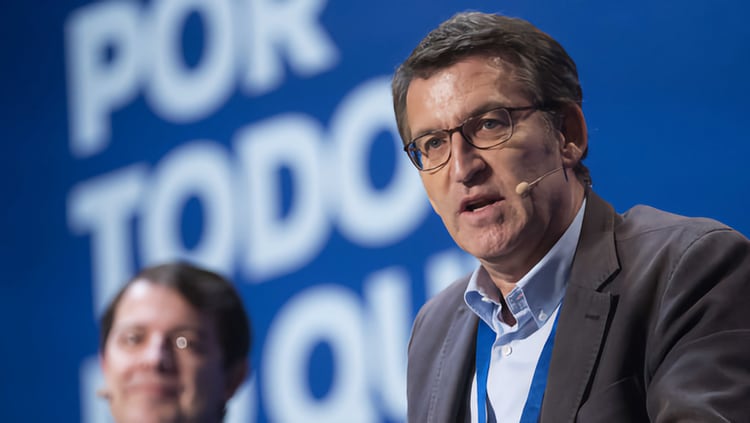Ángel Collado
The long de facto electoral campaign that Spanish politics has already entered into, and which will last the whole year, has its first test in the local elections on 28 May, a date that the Popular Party wants to present as a motion of censure against Pedro Sánchez.
Alberto Núñez Feijóo needs a clear victory for his candidates in the regional and municipal elections in order for the PP to advance in the distribution of local power, but also as the best platform to opt for a victory in votes and seats over Pedro Sánchez and his extreme left-wing partners, based on the defeat of the PSOE.
In the early stages of the national campaign, the two main parties are betting on exploiting what they consider to be their opponents’ main weakness: their dependence on their respective allies. The PSOE is running with the burden of a leader who takes on the causes, projects and even slogans of the most populist left. Sánchez presents himself as the president of the government “of the people” (a term favoured by Pablo Iglesias) against the representatives of “the powerful”, who happen to be the PP.
And, while the PP focuses its attacks on the head of the Executive on his general extremism and his management in favour of Catalan pro-independence supporters and Bildu (the political heir of ETA), Sánchez responds with a reminder of the existence of Vox, the party at the other end of the parliamentary spectrum that threatens to jeopardise future centre-right governments.
For the moment, there are substantial and evident differences in the alliances of the two parties. The first is that Sánchez has presided over a social-communist coalition cabinet for the past three years, in a permanent internal struggle between its sectors, but always united to remain in power, without resignations or resignations.
Moreover, the socialists govern with these same partners and the addition of nationalist and separatist groups in seven autonomous communities: Asturias, Aragon, the Canary Islands, La Rioja, Aragon, the Balearic Islands, the Valencian Community and Navarre. The only regional presidents who criticise or disavow these allies are Emiliano García García-Page (in Castilla-La Mancha) because he does not need them and Javier Lambán (in Aragón) because he aspires to get rid of most of them.
In contrast to these data is the case of the PP, which only governs with Vox in the Junta de Castilla y León and also has to face the opposition of Santiago Abascal’s party in regions such as Madrid, where the extreme right votes unhesitatingly with the extreme left in order to put the Popular Party’s Executive, presided over by Isabel Díaz Ayuso, in a tight spot.
The second key difference in the alliance policy of the two main parties lies in the internal acceptance of relations. While Sánchez unashamedly mimics Podemos and other radical partners, the PP is ashamed of Vox, avoids even Feijóo’s photos with Abascal and is afraid of depending on their votes to come to power, now in all the communities in contention and at the end of the year after the general elections.
The PSOE considers that this is the weakest point in the electoral advance of the Popular Party and repeats, with the same scheme that failed in the regional elections in Madrid and Andalusia, the message of fear of the extreme right to mobilise its own voters.
In view of the successes of Díaz Ayuso and Juan Manuel Moreno Bonilla, in the PP they rule out the possibility that the Sanchista campaign linking Feijóo and the candidates running in the elections on 28 May with the extreme right could make an impression on the electorate. In the main opposition party, they argue that such an effort could even be good for them, given their lack of credibility among the electorate, except for the most left-leaning ones.
With Ciudadanos in a terminal phase, Vox has become the main obstacle to uniting the centre-right vote, which in turn is fundamental to ending the parliamentary hegemony of the current popular-frontist bloc that sustains Sánchez in power.
The PP is reaffirming its idea of exploiting in the campaign the wear and tear of the president of the Government and the PSOE, precisely because of the Podemos pacts and the separatist parties. Suppressing and lowering the crimes of sedition and embezzlement for the benefit of the Catalan coup plotters and reducing the penalties for rape with the law they call “only yes is yes” gives daily ammunition to the PP. And even more so when the legal botch-up in all the reforms leads to a parade of benefited rapists (already almost 200) and threatens to repeat itself in the case of corrupt politicians who will benefit from their own reductions right in the run-up to the 28 May campaign.







